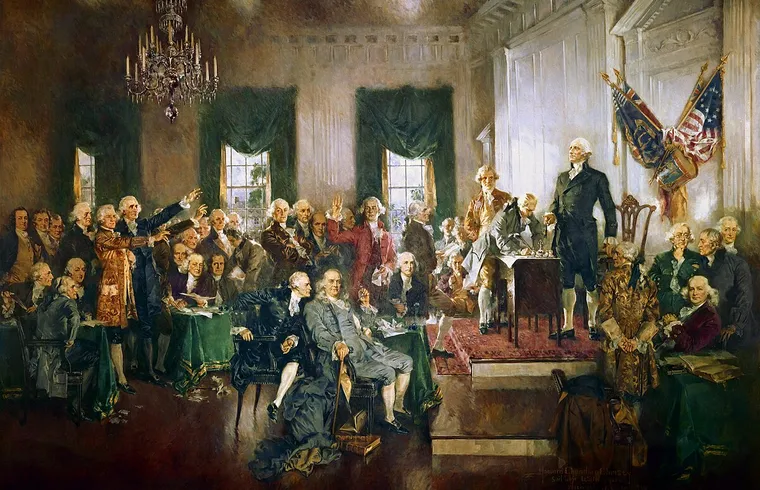Originally Published by Log College Press: https://www.logcollegepress.com/blog/2024/10/9/words-of-counsel-from-the-past-on-how-to-choose-civil-rulers
The God of Israel said, the Rock of Israel spake to me, He that ruleth over men must be just, ruling in the fear of God. (2 Samuel 23:3)
From the earliest days of the American republic, whether in the pulpits of Covenanters who dissented from the U.S. Constitution on the grounds that it failed to acknowledge the kingship of Jesus Christ over the nation and prohibits religious tests for public office, or in those of the mainline Presbyterian Church in the United States of America (PCUSA), who also sometimes lamented that chief deficiency in the Constitution, but more to the point also called for godly leaders to rule over this country, much has been written by Log College Press authors who believed that citizens had a duty to choose among themselves men of virtue and piety to lead the nation. Let us hear from a few.
George Duffield (1732–1790), served as Pastor of the Old Pine Street Church in Philadelphia for 18 years, and as a chaplain to the Continental Congress:
Here it is necessary to observe that the Scriptures were not designed for any one particular nation of people, but as a rule of direction, for the professing people of God, in all parts and ages of the world. And although in the directions given to the Jews, there were some things of a particular nature and particularly designed for that people, exclusive of all other nations under heaven in every age, yet, whatever general directions were given to them, founded in and consonant to the reason of things, these were as much designed for us as for them, and are equally obligatory on us. Who will venture to say that the great charter of blessings confirmed to that people, Deut. 28: and sanctioned by heavy penalties; those denounced in case of persisted in Rebellion against the the authority of God, was not equally designed to inform us as them, of the way wherein to secure national prosperity and avoid national calamity and distress? and has not the experience of all ages, agreeable hereto, confirmed the Sacred Remark — Prov. xiv. 34, that 'Righteousness exalteth a nation,' &c.? This then, being granted, which cannot with reason be denied, it will follow that the directions given to that people to regulate their conduct, in choosing their chief magistrate, and established by God himself as a part of their Constitution, ought at least to have some respect paid to it by Christians, in choosing those who are to bear rule among them; it is certainly, more probable we shall act agreeable to the mind of God in paying a regard to it, as far as our circumstances coincide with those of the people to whom it was given, than by treating it with absolute neglect. These directions are therefore, transmitted down to us, Deut. xvii. 18. Let any one read the passage and then say whether an Infidel Magistrate can by any means be supposed to answer the character; or whether its most plain and natural meaning, if it has any respect or meaning to us at all, is not that as professing Christians we ought to choose officers professing Christianity,
...
A second direction from the sacred pages, 2 Samuel xxiii. 3. 'He that ruleth over men must be just, ruling in the fear of God.' This is an express command of God, and delivered in terms so general, as render it impossible to be restricted to the Jews, but equally designed for us as any other portion of Sacred Writ. And will any say that an Infidel answers to this character, or is likely to rule in the fear of God?" — Who Should Be Our Rulers? (1787)
In 1800, William Linn (1752–1808) and John Mitchell Mason (1770–1829) collaborated to publish (anonymously) an essay which raised concerns about the election to the office of President with the views on religion that Thomas Jefferson had. Linn had earlier served as a chaplain in the Continental Army and as the first chaplain of the House of Representatives.
Were our government not elective, there would be an excuse for a weak or bad man being exalted to the highest place. But when this depends upon our own choice, the blame must rest entirely upon ourselves; and the voice of the nation in calling a Deist to the first office must be construed into no less than rebellion against God. What he said respecting the Israelites when they requested a king, he would say respecting us, 'They have rejected me, that I should not reign over them.' Though there is nothing in the Constitution to restrict our choice, yet the open and warm preference of a manifest enemy to the religion of Christ, in a Christian nation, would be an awful symptom of the degeneracy of that nation, and I repeat it, a rebellion against God. Whatever might be the intention, the conduct would bespeak nothing else. The want of a test or a provision that the supreme magistrate should be a professor of Christianity would show the temper of a nation more clearly, and render their conduct the more striking. We now freely declare our own choice. Would Jews or Mahometans, consistently with their belief, elect a Christian? And shall Christians be less zealous and active than them? Shall we who profess to honor the Son of God, willingly and deliberately promote a man who dishonors him; one who, if he acts upon his belief, must oppose the propagation of what he deems an imposition upon mankind and the source of miseries. Most merciful God! forgive the thought of the heart, to take council together against thee, and against thine ANOINTED. — Serious Considerations on the Election of a President: Addressed to the Citizens of the United States (1800)
In an 1805 sermon, Daniel Dana (1771–1859), who preached several election sermons throughout his lengthy pastoral career, took up as his text 2 Samuel 23:3.
The sentiment inculcated in the text, is then simply this: that Virtue and religion are most important qualifications of a civil Ruler.
...
May it not be rationally apprehended that the wrath of Heaven will fall with signal and overwhelming weight, on a people who, favored with the light of the gospel, the blessings of civil liberty, and the inestimable privilege of electing their own rulers, are yet regardless of their moral and religious character? — The Importance of Virtue and Piety as Qualifications of Rulers: A Discourse Delivered March 31, 1805 (1805)
And in a Fourth of July discourse delivered in 1827, Ezra Stiles Ely (1786–1861), another long-time pastor at Old Pine Street Church in Philadelphia, took as his text Ps. 2:10-12: "Be wise now therefore, O ye kings: be instructed, ye judges of the earth. Serve the Lord with fear, and rejoice with trembling. Kiss the Son, lest he be angry, and ye perish from the ways, when his wrath is kindled but a little. Blessed are all they that put their trust in him."
Let it then be distinctly stated and fearlessly maintained IN THE FIRST PLACE, that every member of this Christian nation, from the highest to the lowest, ought to serve the Lord with fear, and yield his sincere homage to the Son of God. Every ruler should be an avowed and a sincere friend of Christianity. He should know and believe the doctrines of our holy religion, and act in conformity with its precepts. This he ought to do; because as a man he is required to serve the Lord; and as a public ruler he is called upon by divine authority to 'kiss the Son.' The commandment contained in Proverbs iii. 6. 'in all thy ways acknowledge him,' includes public as well as private ways, and political no less than domestic ways. It is addressed equally to the man who rules, and to the person who is subject to authority. If we may not disown our God and Saviour in any situation, it will follow that we are to own him in every situation. Infinite wisdom has taught us, that he who ruleth over men must be just, ruling in the fear of God. No Christian can gainsay this decision. Let all then admit, that our civil rulers ought to act a religious part in all the relations which they sustain. Indeed, they ought pre-eminently to commit their way unto the Lord that he may direct their steps; delight themselves in him, and wait patiently for him; because by their example, if good, they can do more good than private, less known citizens; and if evil, more harm. Their official station is a talent entrusted to them for usefulness, for which they must give account to their Maker. They are like a city set on a hill, which can not be hid; and it is a fact indisputable, that wickedness in high places does more harm than in obscurity.
...
Since it is the duty of all our rulers to serve the Lord and kiss the Son of God, it must be most manifestly the duty of all our Christian fellow-citizens to honour the Lord Jesus Christ and promote christianity by electing and supporting as public officers the friends of our blessed Saviour. Let it only be granted, that Christians have the same rights and privileges in exercising the elective franchise, which are here accorded to Jews and Infidels, and we ask no other evidence to show, that those who prefer a Christian ruler, may unite in supporting him, in preference to any one of a different character. It shall cheerfully be granted, that every citizen is eligible to every office, whatever may be his religious opinions and moral character; and that every one may constitutionally support any person whom he may choose; but it will not hence follow, that he is without accountability to his Divine Master for his choice; or that he may lay aside all his Christian principles and feelings when he selects his ticket and presents it at the polls. 'In all thy ways acknowledge him,' is a maxim which should dwell in a Christian's mind on the day of a public election as much as on the Sabbath; and which should govern him when conspiring with others to honour Christ, either at the Lord's table, or in the election of a Chief Magistrate. — The Duty of Christian Freemen to Elect Christian Rulers (1828)
To be sure, in these discourses, selected from a variety of early American PCUSA ministers, the arguments are not made to institute a national establishment of religion or to invoke religious tests for public office — as Covenanters would argue. But the duty of Christian voters in the United States to employ the elective franchise on behalf of only godly, Christian candidates for office is a point upon which there once was a great deal of consensus across the American Presbyterian Church. In their view, it was a timeless, Biblical truth that virtue and piety were essential qualifications for civil magistracy even in a country without acknowledgment of Christ in its Constitution.


